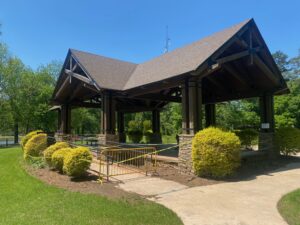The Development Authority of Peachtree City is no more, as a 3-2 vote of the city council determined that a full-time — but vacant — economic development coordinator on city staff, along with the county’s development authority, will be ideal to recruit new business for the city.
DAPC, a seven-member volunteer board appointed by council, has been a political hot potato for more than a year now.
DAPC Chairman Todd Strickland, who has been diplomatic up to this point, could no longer bite his tongue when addressing council Thursday night prior to its final decision.
“What we really need to have happen is for the city council to just get along,” Strickland said. “Say, ‘Hey guys, let’s take the high road when we disagree on something. Let’s figure out how to work together.’”
Strickland urged council to develop a comprehensive economic development plan that features “everybody working together.”
The former developer of the city, Pathway Communities, is no longer involved in economic development and the city must step into that role, Strickland said.
“It is incumbent upon you guys to figure it out and put aside this pettiness,” Strickland said. “And it’s not the problem of the development authority: that’s the symptom. The problem is we can’t get along. And someone needs to step up and say, ‘I’m going to take the high road. I’m not going to necessarily let this small thing over whether or not the economic development coordinator reports to the development authority or to the city manager be this end-all, be-all. … You guys have got to get it done. This is our city that we all care about.”
The crowd then erupted into spontaneous applause.
Strickland said DAPC has always desired “to take our marching orders from the city council” and the authority has been an asset available to the city.
Furthermore, such authorities are employed by Fayetteville, Newnan and other nearby cities.
For example, Strickland argued that the DAPC has been able to meet with a number of existing businesses that the county development authority has not been able to over the past several years.
But Strickland’s words were not enough to convince a majority of council, as the split 3-2 vote had councilmembers Kim Learnard, Eric Imker and Vanessa Fleisch in favor, and Mayor Don Haddix joining Councilman Doug Sturbaum in dissent.
Learnard chided Haddix for continuing to be vocal about steering a new economic development coordinator to work as the staffer for the development authority instead of the city.
“It is my belief that we have a problem and we cannot continue with the same conditions that resulted in failure the last time around,” Learnard said, referring to the controversy that led to the resignation of economic development coordinator Joey Grisham. “What makes me sad is I love these people, I really do. Every one of them, dedicated … and positive people with energy.”
Learnard said she thinks the city will succeed in economic development being led “by the city” in the form of a city staffer reporting directly to the city manager.
“This is a new beginning, and I think we will bring in the right staff, equip them with all the resources that they need, and remove the distractions and the conflicts that have been facing us for a long, long time,” Learnard said.
Learnard pointed to a recent blog authored by Haddix that urged having the coodinator report to DAPC instead, some year after council took its vote on hiring the coordinator as a city staffer reporting to the director of the planning department.
Learnard said the new staffer could ultimately decide the city needs “an advisory panel of some kind” and she hoped some of the DAPC members would serve in that capacity.
Haddix contended that the city could continue to keep the development authority around for $7,500 a year to keep it in existence in case it is ever needed to issue bonds.
But it is precisely that potential for fiscal issues that played a part in killing DAPC, even though existing authority members said they would never encumber the city in such a manner without council’s blessing.
Councilman Eric Imker had previously said he was concerned about the possibility of another tennis center debacle.
Imker was referring to a lawsuit that resulted after the city decided to stop using hotel motel tax money to pay loans incurred years ago by DAPC to operate and maintain the tennis center and amphitheater.
The city ultimately settled the lawsuit, and bonds were issued to pay the settlement.
Councilwoman Vanessa Fleisch said she felt in large part that the DAPC’s role was redundant compared to that of the Fayette County Development Authority, which the city also plays a part in.
“I have decided this is not the way to go, because we have the potential to create a behemoth competing agency with FCDA,” Fleisch said, adding that she felt such redundancy was unnecessary in tough economic times.
Outgoing FCDA President and CEO Brandt Herndon said the authority would issue bonds for any economic development project the city wishes to pursue.
But the redundancy contention was challenged by DAPC member Mike Murtaugh, who contended that his position led to three different major contacts for the county development authority: one for a new company and two for companies that are looking to expand, perhaps at their Peachtree City location.
The out-of-town company was courted by a special meeting orchestrated by Murtaugh to show what it’s like to do business in Peachtree City, he said, before asking councilman Imker to “give his attention for a moment.”
The meeting focused on the city’s village concept and the company being recruited remarked that it sounded “like paradise.”
Murtaugh, who has served leadership roles in corporate marketing, now owns the TCBY at the Braelinn Village shopping center. He said council needs to work as part of the economic development team.
Murtaugh added that DAPC has worked well with Herndon and FCDA.
Council also had some discussion about a proposal last year from Sturbaum that would have dedicated a portion of the millage rate to the authority’s annual budget.
Sturbaum contended that his numbers were “a starting point” for negotiations instead of a concrete proposal. Sturbaum said he hoped DAPC could be seen as a complimentary service to help out FCDA, but he too supported the hiring of an economic development coordinator.
DAPC in recent years has morphed into an organization that has supported the city’s village retail centers, including assistance in starting merchants’ associations at several.
DAPC also funded a $15,000 study from Georgia Tech which urged several key golf cart path connections would help improve business at the retail centers. That project could have cost more than $100,000 or more, and its recommendations were adopted by the owner of the Peachtree Crossings (Glenloch Village) shopping center.
DAPC member Mark Hollums also recalled the authority working closely with The Shopping Center Group during the massive renovation of the Braelinn Village shopping center, which resulted in the businesses facing significant customer access issues.
Strickland also responded to criticism from resident Randy Boyett that records showed DAPC members buying lunches for each other using city tax dollars. “A lot of those lunches were meeting with business and we were going saying ‘Hey we appreciate you being here,’” Strickland said, also addressing the authority’s purchase of tickets to the Frederick Brown Jr. Amphitheater summer concert series as a way to show appreciation to businesses who remain here.










Leave a Comment
You must be logged in to post a comment.